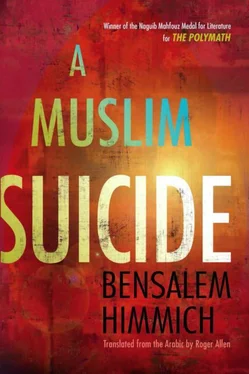"Not before you join us in a visit to the lunatics' asylum," said `Abd al-Barr with a smile.
It had not even occurred to `Abd al-Barr that the young man was in such a panic, but then Bilal started slapping his cheeks and clawing his chest. "Woe is me!" Hamada yelled. "Lunatics? God protect me!"
I signaled to Bilal that he could leave at once, so Abd al-Barr went over to the scared young man, calmed him down, then carried him in his arms back to the place where we had left the horses.
As we made our way slowly back to the zawiya, 'Abd al-Barr asked me if the enormous black man had swallowed his tongue. I recounted to him the man's disturbing history and resorted frequently to mention of God's all-powerful presence. I in turn asked him about the resident in the asylum whom I had come to know. He told me sadly that Al-Tamimi had committed suicide, and Byron the old man and `Ukasha al-Khalti, the asylum manager, had also died. He was sorry that the manager had passed away, and also that his replacement was a steward with a temperament just like Bilal's. The only way he could control the lunatics was by clapping them in irons, beating them with canes, and threatening them with the rack. The mention of this last device raised an issue that I knew nothing about, and my companion explained that the new steward and his brutal staff regularly showed it to any of the inmates who were particularly disruptive and noisy. Either he stopped doing whatever he was doing and calmed down, or else they would rip off his balls or pierce his skull. The entire thing utterly appalled me. I begged the warden to inform the governor about the situation and to ask him to appoint people who were doctors, not sadists.
Once he had indicated his agreement, we proceeded on our way till we reached the edge of the forest. From the top of a lofty palm we heard a voice. "Here I am," it shouted, "watching the Day of judgment happen. Did not the Prophet himself counsel, `If matters are entrusted to incompetents, then wait for the final hour!"' Abd al-Barr told me that this man had been behaving this way for some time, maintaining his vigil and eating figs from the palm tree and whatever else generous folk happened to send up to him by means of a length of rope. The steward at the asylum and his assistants were quite willing to disregard his behavior as long as he did not hurt anyone or start hurling stones at people. He advised me not to bother myself with either his condition or his words.
As we made our way back to the zawiya, I kept rubbing my hands together disconsolately and acknowledging God's almighty power both silently and aloud. By this time it was noon, so we prayed the prayer with the gathered assembly. Once that was over, I said farewell to my friend, in the hope of meeting him later in the evening to celebrate the Night of Power along with other believers.
And that is what happened. No sooner was the evening prayer over than the tiny mosque was filled with people. They all wanted to listen to readings of surahs from the Qur'an, while `Abd al-Barr and his assistants went around hanging up lamps and lighting them, filling censers with incense, and sprinkling rosewater over the attendees. When they all turned their attention to other litanies and devotions, my very breathing and memory joined in lifting them heavenward and kindling their flame. Truth to tell, bonds of brotherhood and holy fragrances began to spread among the assembly, duly accompanied by the scents of purest incense. Afterward hands were raised in supplication to the heavens, ready to be inspired by prayers like so many pearls on this blessed Ramadan night, the Night of Power, which, as the Qur'an says, is "better than a thousand months." Once their voices had turned hoarse and their throats were dry, the warden and his companions suggested that I be asked to conclude the prayer session. Standing up, I launched into a series of prayers in which I included peoples on both shores of the Mediterranean, the community leaders, and humanity in general. I made a special point of mentioning our poor, suffering Spain, but avoided mentioning any political figures. I did my best to be as eloquent as possible. All around me people were listening, necks outstretched as they chanted "Amen" in unison. My final prayer was "Praise be to God, the Lord of the Humanity."
Everyone stood up, and I moved to leave, making my way through the throng and embracing everyone I met. Once I had left the mosque, I headed for my room to get some sleep and rest.
Next morning, I went back to my writings so that I could look them over and make corrections. Things went particularly well with the one entitled The Complete Understanding. Later in the afternoon, I washed, changed my clothes, and prayed. I then gathered up all my papers and put them in my pack in preparation for the trip back to my beloved's house. When I went out to go to the horse stables, I found a man waiting for me.
"Shaykh," he asked, after I had responded to his greeting, "do you believe your prayers are proper?"
"It is my sincere hope," I replied, "that God who hears everything regards them as such."
"Like any Muslim you are enjoined to obey God, His prophet, and the ruling authorities. So why did you not mention the authorities during your prayers on the Night of Power?"
The warden came rushing over at this point, panting all the way, and I greeted him. I told him that I was going back to my family, God willing.
"You can go back safe and sound," my interlocutor said, "but not until you explain why you did not offer prayers for Amir al-Sa`id yesterday. Did you just forget, or was it on purpose?"
"It was simply an oversight," 'Abd al-Barr hurriedly replied. "He simply forgot. Don't you remember what the poet has to say? `Humanity [insan] is only named for its forgetfulness [nisyan].' That's the first half of the line, but I've forgotten the rest of it. By God's mercy, tell me what the rest of it says."
The man was confused for a moment and said nothing.
"The rest of the line," I told them, "is: `And the heart's only facet is to be transformed."'
The warden smiled in triumph. "So, my good man," he said, "I forgot half the verse and our master here remembered it. But you had no idea about either part. So go away and seek knowledge to the extent that you can."
The man stumbled away. As `Abd al-Barr led me and my horse toward the gate, he told me that this ignoramus was actually one of governor Ibn Khalas's spies who had been coming to the zawiya for some time to pick up bits of information. After he had helped me put my bags on the horse and before I rode off, I embraced him warmly, but decided not to tell him that I had refrained from mentioning the ruler's name in my prayers quite deliberately and with forethought; it was no mere slip or case of forgetting. I told myself that it was quite enough that I had managed to avoid listening to any more abuse from this nasty informer.
NOW THAT I HAD RETURNED to my own home with my wife and had celebrated the Great Feast according to custom and tradition, events started to pile up and conditions grew steadily more difficult. The jurists of the town intensified their hue and cry against me and tried to do me ill. Followers gathered all around me, and several of them were clearly inclined to my points of view. The deputy governor made a point of preventing me from holding meetings with them inside the mosque and of not allowing my students from Spain to enter the city of Sabta. Ibn Khalas, the governor, sidled his way out of correcting the situation by claiming that he was too preoccupied with other matters.
This is all with regard to the country where I was residing. As for Spain itself, things were going from bad to worse for the Muslim residents: the Christian alliance had made a peace pact and was gradually closing up the cracks in its fabric. Meanwhile refugees were either descending on Granada and whatever was left of its possessions in hordes or else directly crossing the straits and heading for the Maghrib coast or the interior.
Читать дальше












